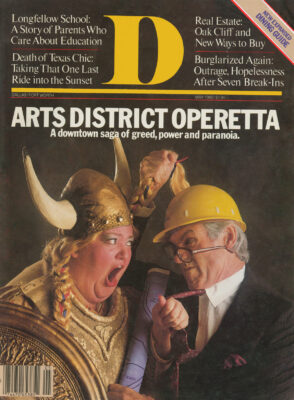OSWIN CHR1SMAN was walking down Main Street last January, bundled against the chill, when something snapped. “I’m not going to do it,” he thought, and he decided to deprive Dallas County of one of its finest judges -himself.
He was up for re-election, and had been heartily endorsed by the Dallas Bar Association’s membership; 92 percent of the lawyers evaluating him in the bar’s poll approved of his overall performance. He was the second most popular of the county’s 17 district court judges, but he worried about losing his job.
More to the point, he worried about what he would have to do to keep his job: hit the cocktail party circuit; glad-hand the lawyers and businessmen whose cases he later would have to rule on; and, worst of all, beg for money.
“1 was walking past One Main Place, after talking with one of the lawyers in town who has been my strong supporter,” Chrisman says. “We had been talking about how much money it would take to win [re-election], and it was about $100,000. He said, ’I think we can raise that,’ and I was walking along and I said, ’I’m not going to do it.’ “
So Oswin Chrisman dropped out, and helped start one of the most sane political movements since the Boston Tea Party.
The fruit of that movement is called “The Committee for a Qualified Judiciary.” It is a bipartisan group trying to keep politics from gutting the courts that Dallas County voters control.
Texas is one of only 14 states that elects judges on a partisan ballot -Democrats vs. Republicans. It is a silly arrangement. Party affiliation has no bearing on a judge’s competence or performance. (Just look at all the judges who have changed parties in the past few years.)
Lyndon Johnson’s landslide presidential victory should have been an ominous warning of the havoc politics can wreak on the courts. “In 1964, there was literally a sweeping out, in those states where they had this system of electing judges on a partisan basis, of experienced judges,” says Forrest Smith, co-chairman of the newly formed committee.
Those casualties were Republicans. In 1980, Democratic judges rode Jimmy Carter’s coattails into retirement. Fred Harless, one of the most respected of the county’s civil court judges, was one casualty. Another was Judge Joe Bailey Humphreys of the Court of Civil Appeals. A third was the judicial system itself.
“A judge who has been on the bench for 10 years is absolutely 10 times more experienced than a judge who’s just coming in, and if he’s been working hard and doing well, to throw him out on the basis of [straight] party voting is a disaster and against the spirit of the judiciary,” Smith argues.
It also works against the future of the judiciary. When a would-be judge sees political happenstance end the career of a judge that he knows is brilliant, hard working and honest (and maybe a year or two away from getting his pension rights), it tells him something.
All those evils plague the system even if the new judge is as good as his predecessor. But in judicial races, accident can be as important as merit.
Take Don Yarbrough, for example. Back in 1976, he and Charles Barrow battled for a vacant position on the Supreme Court. Barrow was one of the most respected judges in Texas. Yarbrough was a lawyer in Houston who happened to bear a name similar to that of another attorney, Don Yarborough, who had run for governor several times. So Yarbrough had name recognition, even if it wasn’t his name people recognized. He also was under investigation by the state Judicial Qualifications Commission for roughly 100 charges of improper conduct as an attorney.
Yarbrough was elected, and soon after was indicted for perjury. He resigned after the 1977 session of the state Legislature had begun impeachment proceedings.
There are supposed to be ways of protecting the judiciary from such accidents. The city bar’s “Judicial Evaluation Poll” is one way practicing attorneys rate the judges. But they cannot rate people who are merely candidates for judicial office. The bar also takes a “Judicial Preference Poll” asking members which candidates they prefer, but lawyers describe it as a mere “beauty contest.” And few voters know the results of either poll.
Under Texas law, judges run for election as if they were any other group of politicians. But judges are not like other politicians. Their code of conduct forbids them to discuss cases or to promise anything to anyone. What can they campaign on?
Money, of course. About $100,000 worth, for a county-wide race. All that advertising doesn’t tell the voters much, but it does build up name recognition.
And how does a judge get $100,000 together every four years? “You beg for money from the people who will be appearing before you,” Smith says.
“I’ve never had a contributor ask for anything in return, but the possibility always exists,” says Chrisman. “And there is the temptation to lean the other way, which 1 think most judges with integrity tend to do, which isn’t fair, either.”
What Texas needs, Smith and his fellow committee members believe, is a way that judicial candidates can be thoroughly and impartially evaluated, and the voters appropriately educated.
The executive board of the Committee for a Qualified Judiciary (CQJ) includes Democrats, Republicans, business and civic leaders – about 150 members, including the last 16 presidents of the Dallas Bar Association.
The CQJ asks each judicial candidate to complete a 15-page questionnaire – the same one given to candidates for presidential appointment to the federal bench. A subcommittee examines those questionnaires, evaluates the candidates’ records, and interviews each candidate. To win an endorsement a candidate must be approved of by two-thirds of the evaluation panel and of the executive committee.
Several candidates may be endorsed in some races; none, in others.
Once the CQJ gives a candidate its stamp of approval, it takes the campaign burden off his shoulders. It spends money for newspaper ads, direct mail campaigns and “endorsement cards” listing the approved candidates. It can campaign effectively for all its candidates for only $100,000.
We have long debated whether judgesshould be immune to politics – as they areon the federal bench – or directly subjectto its whim. The CQJ is a long step towarda proper compromise.
Get our weekly recap
Brings new meaning to the phrase Sunday Funday. No spam, ever.
Related Articles

Hockey
What We Saw, What It Felt Like: Stars-Golden Knights, Game 3
A close final score masks a dominant performance.
By Sean Shapiro and David Castillo

Basketball
What We Saw, What It Felt Like: Mavs-Clippers Game 3
Little brother no more.
By Iztok Franko and Mike Piellucci

Local News
In a Friday Shakeup, 97.1 The Freak Changes Formats and Fires Radio Legend Mike Rhyner
Two reports indicate the demise of The Freak and its free-flow talk format, and one of its most legendary voices confirmed he had been fired Friday.


